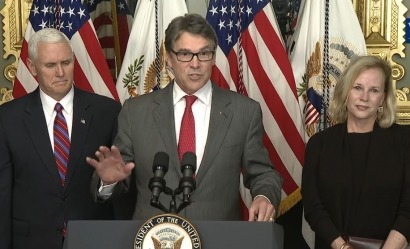
Perry's appointment was approved by the U.S. Senate earlier Thursday by a 62-37 vote. He was sworn in at the White House by Vice President Mike Pence.
Perry served 14 years at Texas governor. Back then he was an early proponent of an "all of the above" energy development strategy, becoming a strong proponent for the philosophy even before former President Barack Obama.
But despite his credibility with some in the renewable energy community because of his past commitment to wind power, Perry's nomination was not without its vocal critics.
As a presidential candidate in 2011 the governor once vowed to shutter the department he now leads.
He's since moderated his views, promising that as energy secretary, he'll work to develop all forms energy -- including wind and solar power and other renewables.
He has also said that will consult with and rely on the guidance of federal scientists -- a group that's felt beleaguered since Trump took office -- including those whose work focuses directly on climate change.
Congressional Democrats said Thursday they believe Perry's commitments in these areas are sincere, but they still worry that down the road he may cede to Republican demands to cut his department's budget.
In other energy-related news out of Washington on Thursday, the Environmental Protection Agency withdraw an Obama-era request that oil and natural gas companies provide information on methane emissions at oil and gas operations.
Last fall, the EPA sent letters to more than 15,000 owners and operators in the oil and gas industry requiring them to provide information on the numbers and types of equipment at onshore oil and gas production facilities, and on methane emissions at the sites.
The agency said it would use the information gathered to draft new regulations intended to reduce methane emissions from existing oil and gas operations as part of President Barack Obama's plan to address climate change.
Methane, the key component of natural gas, has a global warming potential more than 25 times greater than that of carbon dioxide.
Scientists and environmentalists say oil and gas industry is the largest industrial methane source in the United States.
But a dozen oil-producing states, including Texas, Oklahoma and Louisiana, complained the reporting request issued in November as overly burdensome.
EPA Administrator Scott Pruitt said the withdrawal is effective immediately.
"We are committed to strengthening our partnership with the states," he said in a statement. "Today's action will reduce burdens on businesses while we take a closer look at the need for additional information from this industry."
Environmentalists were predictably enraged.
Speaking with the Associated Press, Vera Pardee of the Center for Biological Diversity said "This appalling decision shows how quickly Pruitt is turning the EPA into an oil industry vending machine."
For additional information:

